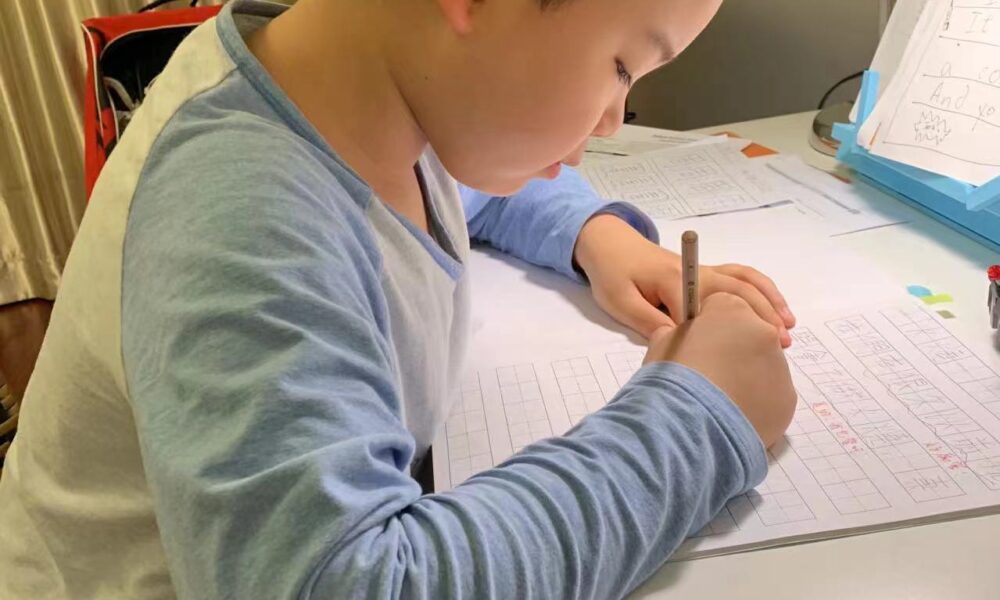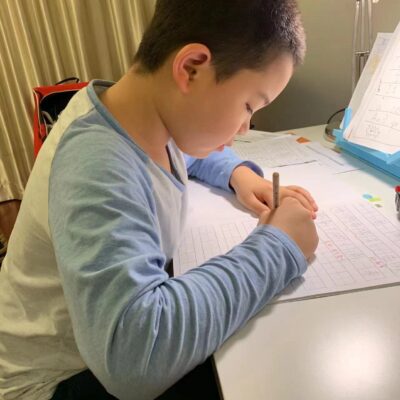This first half of a short story, which Brian wrote in sixth grade, was selected for a student publication at his school, Wu Tong IV: When Rouge Blood Turns to Purple Night. The title of the story is a play on the title of a famous poem that circulated in the Han and Wei dynasties, “Conscription at Fifteen.” The poem describes the tragic tale of a soldier who enlisted in the army at age fifteen and does not return home from the army until he is in his eighties.
The narrator of the story returns to his village on a chilly autumn day. The narrator loses himself in the beauty of the familiar scenery before his family home. The narrator thinks of childhood times and mourns the loss of his brother. He spots a muscular youth as he walks through the village. The youth piques his interest, as after the narrator’s sixty five years in the army the village has mostly emptied. The youth calls out to him and asks him to relay the story behind his scars and two missing fingers. The narrator complies, beginning sixty five years ago.
At that time, his family was starving. They ate anything they could find, including tree bark and grass roots. Hearing that the army offered a fee for enlistment, he joined the army half-heartedly and foolishly. His family feared and worried for him, but he saw no other way out of their situation. The only letter he received while away from home was news of his father’s passing, caused by stress after the narrator’s brother squandered the little money their family had gambling. After the narrator’s return, he learned that the same brother worked hard and earnt back the money he lost. However, his family rejected him, and his guilt led him to drown himself in a river.
Because of the army’s mass recruitment, supervision became lax. The narrator’s training was casual and his initial experience in the army was void of the heroism he imagined. He spent his days without complaint, and recalls fond memories with fellow soldiers as some of the most precious moments in his life.
The peace was broken when the Xiongnu enemy attacked. From his place atop the wall, the narrator witnessed death and suffering at the hands of his fellow soldiers. While they seemed indifferent, the narrator felt deeply the anguish of battle. In the winter, the narrator’s unit lost many of their soldiers in a failed ambush, their dark blood blooming across the snow like plum blossoms. The narrator was frozen on the spot, distantly processing the cacophony of screams. His daze was broken when an enemy pierced the soldier in front of him, his friend. Screaming his name and thinking of the bantering that took place between them just a month ago, the narrator’s hot tears spilled onto the frozen ground. Remembering the face of his friend’s murderer, he vowed to take revenge.
Though he escaped, a seed of hatred sprouted in his chest. Memories haunted his dreams, and the narrator’s anger turned murderous. They lost their commander in the same battle, and their new commander was much harsher than the last. After severe training under this commander, each of the soldiers were prepared for the battle that was soon to come.
In the fall, Xiongnu were known to plunder the villages on the borders of the country. This year, they happened to pillage royal property, incurring the wrath of the emperor. The narrator’s unit was ordered to attack, with bounties for enemy heads. The battle began in the desert on a windy night amidst war cries, drums, and gongs. The narrator caught sight of the man who killed his friend: the same scarred face, big ears, and little eyes. Crying out, the narrator plunged his sword into the man’s chest, severing his head and cutting off his ears. After feeling brief joy for avenging his friend, the narrator felt bloodthirsty once more. His next target was the enemy leader. The narrator struck him through his armor, and severed the head, the mouth still open in a silent scream.
After the successful battle, the narrator brought the head and helmet to his commander. After inspecting it, the commander exclaimed that the pattern on the helmet marked Xiongnu royalty. He told the narrator that he would look into the enemy’s identity. Word got back a few days later that the corpse’s head likely belonged to a Xiongnu prince.
“You’re going home soon!” The commander told him, a hand on his shoulder. He then asked the narrator not to forget him once his status was heightened to an official. The narrator rejoiced at the news that he could return home, holding back tears as he mounted the carriage taking him away. That was the day of his sixteenth birthday.




